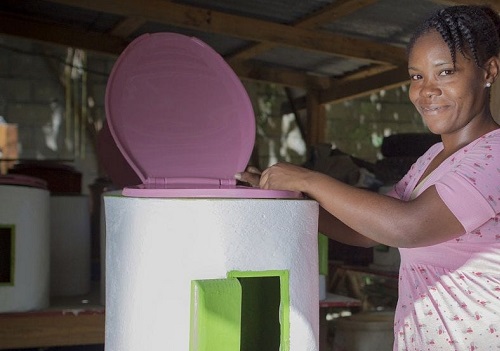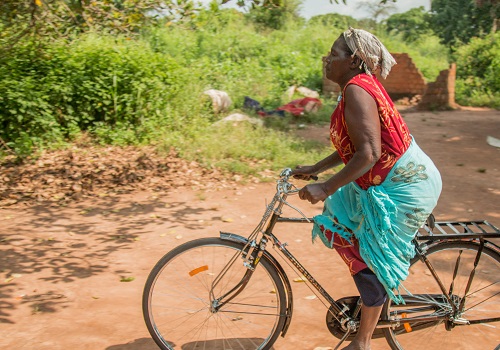Imagine if a public toilet was your only sanitation option. In the best of times it’s a scary and unpleasant choice. Now imagine being asked to stay home when you don’t have a toilet in-house.
Most of us take private bathrooms for granted. But public washrooms are essential to many. “And that’s a huge thing that people in vulnerable communities have to deal with, and a whole new level of risk when asked to quarantine,” says Sasha Kramer, executive director of SOIL, which produces and sells cost-effective composting toilets and organic compost to battle Haiti’s sanitation crisis (learn more about SOIL from our earlier podcast).
Everyone has been impacted by the pandemic. Anxiety is high, while health concerns weigh heavy no matter where you live. But residents of urban centers in the developed world are generally able to access medical care, groceries and other essential services, whether in-person or online. Vulnerable communities in the so-called “developing world” don’t have those luxuries. Many have little, if any, savings, depend on in-person interactions (many informal) to support their families, have limited access to healthcare and live in tight quarters. With social distancing and other restrictions in place, these communities are facing greater hurdles, a reality that is impacting already-precarious situations across the globe.
Haiti’s challenges have intensified
For Kramer, meeting the needs of clients who urgently require sanitation products is made that much harder today. Since Haiti has put a stop to sales of non-essential products and services, many of SOIL’s customers will be taking a major economic hit. As Kramer explains, “We can continue to provide our service; the challenge is how will they pay for it?”
SOIL provides cost-effective household sanitation services to impoverished urban communities in Haiti. Credit: Bernard Cherellus
In truth, it’s always been difficult for SOIL employees – who are intimately connected to the communities in which they work – to ask people with little income to pay for a basic human right: sanitation. But that struggle has become more pronounced now, says Kramer, who adds that the number of people infected by COVID is expected to spike shortly in Haiti.
The country’s fragile telecommunications infrastructure doesn’t help matters. “That telecom breakdown means I don’t have a great feel for how collectors and compost teams are feeling.”
Uganda’s last mile is feeling the impact
Communication – or rather miscommunication – is a concern for Molly Burke too. She’s the co-founder and CEO of Cycle Connect – a social enterprise that works in the last mile areas in Uganda, equipping smallholder farmers with the necessary tools to break out of extreme poverty (to learn more about the venture, read our earlier article).
The rural communities are regularly cut off from resources, including critical information. It’s a challenge that Burke faces each day. But since the COVID-19 pandemic, the situation has exacerbated in significant ways. “Misinformation is spreading faster than the virus itself,” says Burke. “There is confusion among farmers on what is illegal and legal, including going to the farm itself. The information that reaches the last mile is mostly distorted.”
Healthcare has been impacted in crucial ways too. Healthcare providers must walk for hours to get to work, while patients are often unable to reach health clinics on time, with many dying despite suffering from otherwise treatable diseases.
Food security is a growing concern
What’s more, as of mid-March, government restrictions in Uganda shut down most forms of transportation, including public, motorcycle taxis and nearly all cars. As a result, communities are even more isolated, with “bicycles quite literally the only means of transportation at this time,” Burke explains. With such a severe restriction on transportation, the few farmers who can purchase inputs for their farms are struggling to get them.
Add to that the market and seller restrictions, which is affecting food security in the country. With markets closed, farmers are finding it hard to purchase food and seeds, while others are resorting to eating their own seeds due to the lack of access, leaving them with no seeds for the planting season.
Stepping up to help
The challenges are definitely adding to Cycle Connect’s workload but Burke is determined to meet them head-on. Helping last mile communities access opportunities is their objective, after all. “Our mission is focused largely on our day-to-day, but our reason for existence is a tenet throughout the organization and is most applicable now in the wake of COVID-19.”
To counter misinformation or lack of information, for example, the team is communicating critical details of the virus to communities, while gathering data on the issues facing smallholder farmer clients. To help medical centers in northern Uganda deal with the lack of transportation – one of their biggest challenges at this time – Cycle Connect has donated bicycles to ensure that workers can show up to work on the frontlines.
And to help farmers, Burke’s team is working with the government to continue their operations as an essential service and to develop a new loan. “Seeds and Tilling” is focused on giving farmers the resources they need to keep them food secure.
SOIL has upped their game too, wherever they can. Ironically, the urgent situation has pushed them to move forward quickly on a technology that can optimize routing. The new tool will ultimately increase the efficiency of their service to help meet the needs of more people at lower cost. They also doubled the size of their field teams, hiring temporary contractors for rotating shifts.
And they’ve seized the opportunity to strengthen partnerships with government. “It’s been a chance to ask, ‘how can we support your work on a coordinated response and we need support in these ways,’” she says. “I think it will lead to better collaboration moving forward.”
Kramer is hopeful they will be able to have an impact. But that promise is tempered by heightened concern around the realities of a pandemic that is only adding to the burden that vulnerable communities already face – and for those working with them.
Elisa Birnbaum is the publisher & editor of SEE Change Magazine and the host of its podcast. She’s also the author of In the Business of Change: How social entrepreneurs are disrupting business as usual




Touching, Inspiring, Courageous. Bravo.